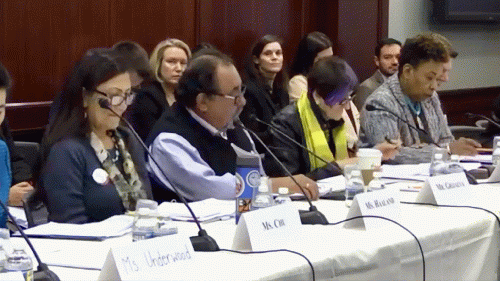"We are preparing to bury one of my grandsons who was shot and died quickly after Saturday night woke up to a cold house my furnace gave out this morning next figuring out what needs to be done"no travel, no purchases, emergency work only because of the shutdown."
This morning's text message from a Native friend in South Dakota was a shock and opened my eyes to a hidden and devastating consequence of the federal government shutdown.
Mainstream media has barely whispered about the effects of the shutdown on Indian Country. As of today, there are more than 800,000 federal employees and contractors working without pay, according to media reports. Having no idea how this affects reservations in the Heartland due to the under-reporting, I contacted Avis Little Eagle, publisher and editor of the Teton Times. We met and collaborated during the Standing Rock protests.
"Most of the unpaid workers are employed by the Indian Health Service, a division of the Department of Health and Human Services, or by a third-party health care contractor," Little Eagle said.
Little Eagle added, "If you look at the flip side or count our blessings so to speak - it opens our leaders eyes to how dependent they are on Government and maybe will seek to diversify and cut apron strings."
I thought this was a wise reference to the fact that the U.S. government is in a "caretaker" role with the Native populations. I have seen some of the health facilities, and can attest that the "caretaker," even before this shutdown, has not demonstrated care or fulfilled treaty promises.
Remi Bald Eagle is the intergovernmental affairs coordinator for the Cheyenne River Sioux. He told the Washington Times that employees being forced to work without pay is having an outsized impact on Eagle Butte, South Dakota, which is the seat of government of the reservation. "And now you have 200 employees not getting paid on this reservation. That's going to have a huge impact on our small economy," Bald Eagle said.
Located just south of the Standing Rock reservation, and west of the Missouri River, the Cheyenne River Indian Reservation was created in 1870 after the Indian wars, when the U.S. broke up the Great Sioux Nation in a series of treaties. Current census stats indicate that approximately 41.6% of families and 47.9% of the population are below the poverty line. The 2018 federal poverty level is $25,100 for a family of four. This includes 58.9% of those under age 18 and 21.6% of those aged 65 or over.
"Those who are most vulnerable are those who most immediately feel the effect," said Chairman Raà �l M. Grijalva (D-Ariz.) at a January 15 meeting of the Democratic Steering and Policy Committee. The event featured two panels of witnesses and a broad cross section of the House Democratic Caucus.
The invisible are being hurt, and are being hurt badly.
"The Trump administration and its friends in Washington can only continue this shutdown if the real costs remain invisible, and we're well past that point," Grijalva said. "Families across Indian Country are suffering health and economic impacts too upsetting to ignore."
Here is his opening statement
Impacts to Indian Country health services are especially grave, and Indian Health Service (IHS) programs still have no appropriations for the current fiscal year, according to a press release. The House recently passed bill (H.R. 266) to fund IHS at $4,072,385,000 for the remainder of fiscal year 2019.
(Note: You can view every article as one long page if you sign up as an Advocate Member, or higher).







